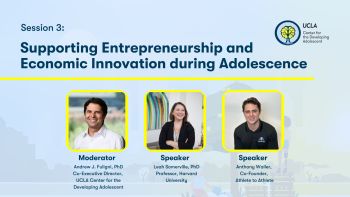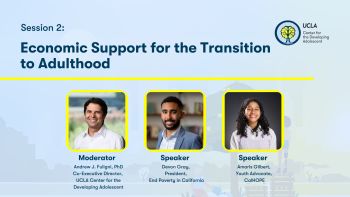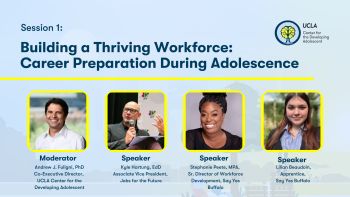Blog: 2025/05

Supporting Entrepreneurship and Economic Innovation during Adolescence
May 30, 2025Research has shown that adolescents are exceptional learners and are more willing than adults to explore situations with uncertain outcomes. In the last session of the 2025 Adolescent Development Symposium, researchers and young entrepreneurs discussed why brain development during adolescence makes us particularly inclined to innovate and participate in entrepreneurship, and how this can be a way for young people to take positive risks and even set them up for future success.

Economic Support for the Transition to Adulthood
May 29, 2025Transitioning to the responsibilities and demands of adulthood can be both exciting and challenging for us all. But without support, the challenges can make the path to a financially secure adulthood more difficult, as young people need to prioritize securing necessities like housing or food, and delay or forego opportunities that could increase their economic mobility. In the second session of the 2025 Adolescent Brain Development Symposium, researchers, policymakers, and youth advocates discussed how we could use financial assistance to help young people navigate this transition to adulthood and how we should implement these types of programs.

Building a Thriving Workforce: Career Preparation During Adolescence
May 27, 2025“Workforce development and focusing on career preparation is fundamentally a developmental question,” says Andrew Fuigni, co-executive director of UCLA CDA, to kick off the first panel discussion of our 2025 Adolescent Brain Development Symposium on economic opportunity.
So, how do we create career preparation policies and programs that effectively support young people in the pursuit of meaningful careers while integrating developmental science to support positive development and future outcomes?
Press Releases
February 25, 2025: Announcing the UCLA Center for the Developing Adolescent’s 2024 Annual Report
January 17, 2023: New Guides Help Organizations Build Effective Youth Engagement Programs
August 16, 2021: New Report Examines Intersection of Anti-Black Racism on Youth Development
November 30, 2020: Center for the Developing Adolescent Announces New Advisory Board Members
October 1, 2020: Center for the Developing Adolescent Announces New Leadership
